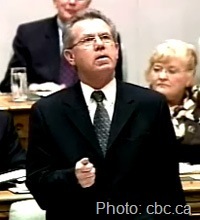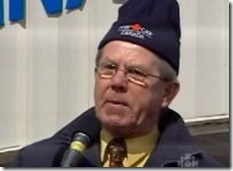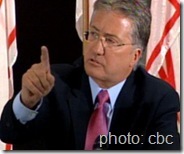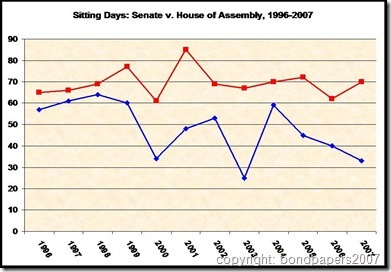People should not be afraid of their governments.
Governments should be afraid of their people.
'Tis that time of the year once more, dear friends, when the political origins of an ancient commemoration once more slips a wee bit more from the popular view. This is a shame since in the events marked by bonfires in many parts of the Commonwealth we may find a timely inspiration.
The Gunpowder Plot was an attempt at violent political change and the book and movie from which the opening quote is taken contained its share of violence. Yet, violence is not as sure a means of effecting political change as knowledge and words.
Discovery of the Plot set back the cause of Roman Catholic emancipation in Britain for some two centuries, yet experts will equally argue that had the plot succeeded in killing the King and the Protestant members of parliament, it may well have led to a period of even greater repression of Roman Catholicism throughout the United Kingdom.
Compare that experience with events in India before 1947 or in the United States when the power of non-violence coupled with information produced far more dramatic and positive social and political changes.
The truth is that governments in the past century of human civilization do fear their people. They fear not so much the potential for violent revolution, although that has occurred. Rather if we look to Pakistan of just the past few days, we see the actions of a government declaring martial law because it feared the prospect of a change in government administration through legal, i.e. peaceful means. The pretext for martial law is a particular decision of the country's Supreme Court, but the struggle between the courts and General Pervez Musharraf go back many months. The rule of law has been frustrating the General's plans and, in some respects, it may only have been a matter of time before Musharraf or another member of the armed forces that has ruled the country for too many years seized power.
Closer to home we may also see evidence of a government that fears its people. The Prime Minister recently ruled out the prospect of an inquiry into allegations against one of his predecessors, not because the allegations have already been reviewed, but because such an inquiry would be "dangerous".
Yet neither the Prime Minister nor his predecessor found the prospect of public inquiries into other matters to be "politically driven", or in the case of Paul Martin sufficiently dangerous to his own political fortunes to serve as an excuse for not appointing an investigation.
The Prime Minister, we would contend might be afraid of the implications such an inquiry might have for his own administration. He is almost certainly afraid of undermining his own politically driven use of past misdeeds.
Closer to home, we find another government and another first minister seemingly afraid of the people. The struggle in this instance is waged with words that are effectively stripped of any real meaning. The legislature is kept closed while the evidence makes plain that the excuses offered by the cabinet are nonsense.
People are warned against demanding increased public spending on one or another cause they consider good because of "the debt." Never mind that the debt has increased and that public spending under the current administration has kept pace with the flow of petro-dollars; the spending of course, is on things which the government considers important. People should scarcely need reminding that this same administration has refused to tell the people what they will actually be charging developers for the right to develop public natural resources and fought for the longest time to prevent an inquiry into spending on fibreoptic cables. These are actions, we are reminded of an open, accountable and transparent government.
Therein lies the clearest example of how governments show their fear of the people who they would rule. Culture and history are malleable and the very meaning of common words may be altered to the point where even reasonable people cannot grasp the inherent contradictions in what they claim.
I like the fact that our current premier seems intent on appealing to the strengths and skills of the people of this place. I like the fact that his government beefed up the rules for MHAs in the wake of the constituency-allowance spending scandal, based on Chief Justice Derek Green’s recommendations.
or from the earlier column:
He preaches that the solution lies not with him, but with us.
How "he" alone accomplishes this we do not know, especially when the political program is designed to increase government control over resources rather than creating an environment in which enterprising individuals may flourish. How "he" should be credited with introducing those rules when, as anyone may well see, "he" allowed the inappropriate spending - the allowances not the alleged criminal activity - to flourish until discovery of the latter revealed the former; let us not forget either that implementing those rules was delayed, as the columnist's own paper reported, while people were led to believe something else. The "solution" - no problem is defined - cannot rest with "us" when the entire premise of the administration is founded on "him" being in charge; "us" should dutifully follow and offer only positive suggestions in support of whatever is decided by "him" and "his" ministers.
Words can have no meaning in a world where they are changed at whim, where information is withheld from the public and where, as it turns out, even editors have let slip the mooring lines of fact.
I remember how the meaning of words began to change. How unfamiliar words like "collateral" and "rendition" became frightening, while things like Norsefire and the Articles of Allegiance became powerful. I remember how "different" became dangerous.
Another writer called it Newspeak, but in other works, George Orwell demonstrated his clear appreciation of how language may be perverted to obscure meaning and thereby frustrate public understanding. In some countries, governments show their fear of people with violence. In others, they show fear by doing violence to language and history.
Both fears are rooted in the understanding that power rests ultimately the individuals within a society. Yet in any democracy worthy of the name, there is no legitimate reason for fear nor for the response it seems to engender from the governors toward the governed.
In Pakistan, the country has taken a step backward from democracy and only time will tell how the Pakistani people will respond.
In Canada, we may continue to work for change and to exercise our power as citizens in a democracy in the country as a whole or within the province. We must reject the debasement of language and history.
True power, after all, does not come from the barrel of a gun. It comes from the exercise of basic freedoms, despite what some governors may ponder.
As individuals in a free society, we should remember that true power comes from the mind.
-srbp-

 The table - shamelessly lifted from
The table - shamelessly lifted from 

 And while Danny is off having a bit of a lark, the province has been left in the hands of this man,
And while Danny is off having a bit of a lark, the province has been left in the hands of this man, 



